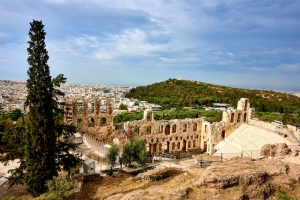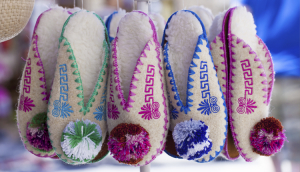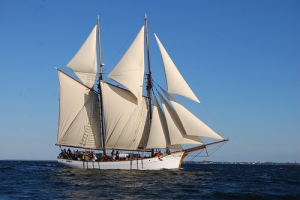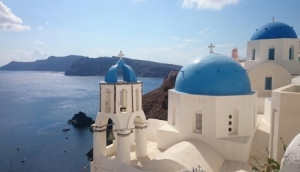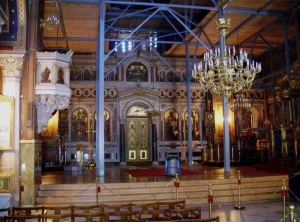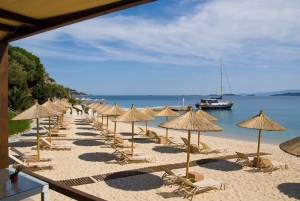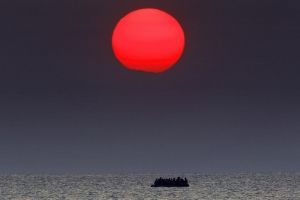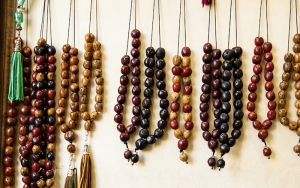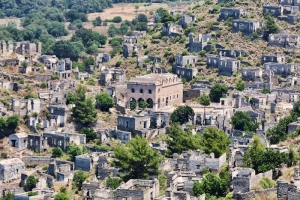ABOUT US
XpatAthens
Monday, 14 October 2019 07:00
How The City Of Athens Was Named
Athens is the capital and the largest city in Greece. It is one of the most ancient cities in the world, and its documented history spans over 3400 years.
Athens was initially called "Akti or Aktiki" from Aktaeus, the first King of Athens, and later it was called "Cecropia," a name derived from King Cecrops.
Cecrops succeeded King Aktaeus after marrying his daughter. According to Greek mythology, the lower part of his body was the same as that of a dragon. During Cecrops' reign, Athena and Poseidon competed for the protection of the city, each offering gifts.
Poseidon struck his trident on the rock of the Acropolis to reveal a spring of saltwater and a horse ready to serve the Athenian people; Athena, on the other hand, offered an olive tree.
According to legend, Athenian men voted for the gifts of Poseidon, and the women voted for the gift of Athena. Because there was one woman more than there were men, the goddess Athena was preferred, and from that day onwards, the city has been known as Athens.
Originally posted on: e-istoria.com
Published in
Greek Language & Culture
Tagged under
Tuesday, 12 March 2019 07:00
One Day In Athens With Young Kids
Mother of 2, blogger Celeste from Family Goes Out, has been living in Athens for more than 16 years. Here, she shares with us her tips for exploring Athens in 24 hours with kids!
As parents we all know that traveling and exploring with young children has it’s limitations. It is not possible to visit the ‘Top 5 Athens Favorites’ in just one day. If your baby is small enough for a carrier or your toddler sleeps in the stroller, you could actually spend a whole day and evening outside your accommodation. But even the most active child cannot walk all day long.
I suggest a walking tour that I have often done myself with my young children. It is a realistic and real itinerary that is flexible and suitable for the whole family. It can start around 9am and ends around 7pm.
Syntagma Square
Syntagma square is our starting point. Here your family can enjoy the Greek Parliament Building. They can also witness the amazing changing of the ‘evzones’ guards at the Tomb of the Unknown soldier right. This takes place every hour, your kids will be fascinated! They will also enjoy feeding the pigeons here.
The National Gardens
From Syntagma Square it takes about 5 minutes to enter the National Gardens at the entrance on Amalias Avenue. Here your family can enjoy the little zoo, the turtle pond or have a break at the playground. Older children will enjoy the children’s library or discover the amazing selection of trees and plants in the botanical gardens.
Coffee Break
It is time for a break at Aegli Zappiou restaurant inside the National Gardens. It is a good chance to see another Athenian monument: the Zappeion Megaron. If you sit outside at Aegli, you have a wonderful view on the Acropolis. There are no cars so kids can run around on the terrace and you will still be able to see them. Aegli is family friendly and offers lots of healthy choices in both food and drinks.
To read this itinerary in full and for more of Celeste's suggestions, please visit: Family Goes Out
I suggest a walking tour that I have often done myself with my young children. It is a realistic and real itinerary that is flexible and suitable for the whole family. It can start around 9am and ends around 7pm.
Syntagma Square
Syntagma square is our starting point. Here your family can enjoy the Greek Parliament Building. They can also witness the amazing changing of the ‘evzones’ guards at the Tomb of the Unknown soldier right. This takes place every hour, your kids will be fascinated! They will also enjoy feeding the pigeons here.
The National Gardens
From Syntagma Square it takes about 5 minutes to enter the National Gardens at the entrance on Amalias Avenue. Here your family can enjoy the little zoo, the turtle pond or have a break at the playground. Older children will enjoy the children’s library or discover the amazing selection of trees and plants in the botanical gardens.
Coffee Break
It is time for a break at Aegli Zappiou restaurant inside the National Gardens. It is a good chance to see another Athenian monument: the Zappeion Megaron. If you sit outside at Aegli, you have a wonderful view on the Acropolis. There are no cars so kids can run around on the terrace and you will still be able to see them. Aegli is family friendly and offers lots of healthy choices in both food and drinks.
To read this itinerary in full and for more of Celeste's suggestions, please visit: Family Goes Out
Published in
Kids Life
Tagged under
Tuesday, 14 June 2016 07:00
The Odyssey Meets Greece
Meeting the Odyssey is a social and artistic collaborative project sailing from the Baltic to the Mediterranean Sea. Each summer from 2014 to 2016, artists and organizers from different European countries travel together, giving workshops and performing theatre pieces.
The project combines elements of the Odyssey, contemporary themes relevant to Europe and stories collected through exchanges with the local population. But Meeting the Odyssey is also a journey in and of itself: bringing people together through long term collaboration and discovering new artistic landscapes and cultural attitudes to develop synergies at the European level.
In 2014, the ship Hoppet sailed in the Baltic Sea, in 2015 in the Mediterranean Sea and this year, the tour will take place in Greece.
Here is what the Project Manager, Matilda von Weissenberg, had to say:
It is time for this project to reach its last tour. It is time to set sails and reach the final destination: Greece, the home of Odysseus himself, the origin of so many myths and legends, philosophers and artists.
When we planned the Meeting the Odyssey project in 2012, we decided that the last tour would happen in Greece as a tribute to all culture, arts, civilization and heritage that we can thank Greece for. Another reason was to show solidarity with the in times of economical crisis. We wanted to go against the trend of blaming the south for the crisis. We wanted to do something that would unite Europeans instead of dividing us. Meeting the Odyssey was our answer to those first signs of EU’s internal crisis that were discernible already back in 2012 – with a ship filled with theatre we wanted to enhance intercultural dialogue and overcome prejudices.
We have sailed many seas and performed in many ports since those planning days. Almost 19000 people have seen the performances in 25 places all over Europe. Meeting the Odyssey started its journey 2014 in St.Petersburg in the middle of very difficult relations because of the Crimean crisis. After a rainy and cold tour on the Baltic Sea, the project reached Central European places like Prague, Opole and Berlin. In 2015 the tour went around Italy, France and Malta, stopping also at Lampedusa, the island where so many migrants have landed after a dangerous trip from the African continent. All along, this project has been somehow present in the places of concern in Europe. The same pattern continues as we reach the final tour in Greece.
The European spectrum has changed during these years. We started out focusing on the collaboration and dialogue within Europe. We end up confronting us with a situation far more complex, where all of Europe is trying to deal with the arrival of thousands of people from outside Europe, people who represent different cultures, religions and languages. How can Meeting the Odyssey face these challenges? How can we, as artists, contribute to a better understanding between cultures and traditions? Can we do anything at all?
We think we can. We have a beautiful sailing ship called Hoppet to take us around in the Adriatic, Ionian and Aegean Seas and we have over 50 artists from all over Europe ready to perform fantastic theatre productions as well as Instant performances and workshops. Here we come Greece!
For more information, please visit: Meeting The Odyssey
Here is what the Project Manager, Matilda von Weissenberg, had to say:
It is time for this project to reach its last tour. It is time to set sails and reach the final destination: Greece, the home of Odysseus himself, the origin of so many myths and legends, philosophers and artists.
When we planned the Meeting the Odyssey project in 2012, we decided that the last tour would happen in Greece as a tribute to all culture, arts, civilization and heritage that we can thank Greece for. Another reason was to show solidarity with the in times of economical crisis. We wanted to go against the trend of blaming the south for the crisis. We wanted to do something that would unite Europeans instead of dividing us. Meeting the Odyssey was our answer to those first signs of EU’s internal crisis that were discernible already back in 2012 – with a ship filled with theatre we wanted to enhance intercultural dialogue and overcome prejudices.
We have sailed many seas and performed in many ports since those planning days. Almost 19000 people have seen the performances in 25 places all over Europe. Meeting the Odyssey started its journey 2014 in St.Petersburg in the middle of very difficult relations because of the Crimean crisis. After a rainy and cold tour on the Baltic Sea, the project reached Central European places like Prague, Opole and Berlin. In 2015 the tour went around Italy, France and Malta, stopping also at Lampedusa, the island where so many migrants have landed after a dangerous trip from the African continent. All along, this project has been somehow present in the places of concern in Europe. The same pattern continues as we reach the final tour in Greece.
The European spectrum has changed during these years. We started out focusing on the collaboration and dialogue within Europe. We end up confronting us with a situation far more complex, where all of Europe is trying to deal with the arrival of thousands of people from outside Europe, people who represent different cultures, religions and languages. How can Meeting the Odyssey face these challenges? How can we, as artists, contribute to a better understanding between cultures and traditions? Can we do anything at all?
We think we can. We have a beautiful sailing ship called Hoppet to take us around in the Adriatic, Ionian and Aegean Seas and we have over 50 artists from all over Europe ready to perform fantastic theatre productions as well as Instant performances and workshops. Here we come Greece!
For more information, please visit: Meeting The Odyssey
Published in
Greece In The News
Tagged under
Monday, 13 June 2016 10:41
Best Of The Best In Athens
The most ubiquitous symbol of summer, beyond blue skies, tan lines and flip-flops, must be the endless stream of top 10 lists – top 10 summer patios, top 10 rooftops, top 10 summer cocktails, top 10 best beaches – and the list goes on…
I seem to read these lists every day – my Facebook feed has precious little else these days, apart from kitten videos and the like… We all have our own top 10’s, our favorite spots and our favourite ‘locals,’ but I often find myself trying to find these lists again and again, when I’m looking for an interesting activity or asked for a recommendation.
So here you have it – my ‘Top 15 list of Top 10 Lists’ – some in English, some in Greek, but you’ll get the point I’m sure. Check these out to see what you might be missing:
1. Best Ice Cream in Athens
2. Best Places to Run in Athens
3. (Greek) Top Agrotourism Excursions
4. Best Beaches of the Ionian
5. (Greek) Best Organized Camping Spots in Greece
6. Best Traditional Coffee Houses in Greece
7. (Greek) Best Swimming Spots in the Peloponnese
8. Best Affordable Sushi in Athens
9. (Greek) Top Attica Beaches for Families
10. Best Sandy Beaches Around Attica
11. Best Cafes in Athens
12. (Greek) Top Cultural Weekend Getaways
13. Top New Athens Summer Bars
14. Top 8 Rooftop Bars & Restaurants in Athens
15. Top Athens Summer Brunch spots
…and although this is not a top 10 list, this a list that will surely come in handy:
16. Athens Live Music Events for Summer 2016
So take your pick, make a plan, and get out and enjoy the glorious summer sunshine… Before you know it, we’ll be looking at Top 10 Ways to Escape Winter…
Until next week,
Jack
*We'll work on getting the Greek into English and bring you an update of all the above very soon!
*We'll work on getting the Greek into English and bring you an update of all the above very soon!
Published in
My Week In Athens
Tagged under
Monday, 13 June 2016 07:00
Kalimera Santorini: 3 Days On A Greek Island
If you’re heading to Santorini this summer, this article is for you! Recently listed as the #1 island in Europe, Santorini is on the list for many. Blogger, Laura Burgess, writes about her perfect itinerary for visiting this Greek island, as well as great places to stay, how to get there, and what to pack with you!
Day 1
8:00 am: Walk to Firá and grab a fredo espresso (iced espresso) and a pastry at the bakery in the main square. The fredo espressos are some of the best in the region and it’s a perfect way to start a busy day.
9:00 am: Meet your tour guide in the center of Firá who will take you on a walk of a lifetime. Santorini Walking Tours offers four walking tours, but a must-see is the Firá to Oia Caldera hike. You won’t be disappointed, trust me.
1:00 pm: After you finish your walking tour, you will have landed in Oia, the colorful, boutique-y village that is one of the prettiest spots in Santorini. Definitely spend some time here eating, shopping, and exploring all the cobbled secret passageways. Have lunch on the terrace at Melitini and enjoy more caldera views while you sit back and enjoy a nice mezze, aka tapas, style lunch and of course, a glass of wine.
3:00 pm: Oia is the place to shop with plenty of boutiques offering women’s contemporary fashion, jewelry, and artwork. Check out the world famous Atlantis Books and AK Gallery, two don’t miss stops while you are there.
6:00 pm: Grab an ice cream and head down to Katharos beach in Oia just in time for a mini-siesta and to watch the applause worthy sunset. Katharos beach is my favorite place to watch because it’s peaceful and away from the “sunset crowd.” If you wish to be a part of the crowd, go towards the windmill and grab a seat anywhere. As the sun sets, you will hear lots of applause. It’s silly, but it makes me smile every time.
8:30 pm: Once the sun goes down, you will probably be tempted to head back to Firá, but I recommend staying in Oia just a bit longer and grabbing a drink at MaryKay’s bar, which is right across from Atlantis Books. They have excellent cocktails and always offer a little snack to hold you over until dinner. The buses back to Firá are chaotic and crowded just after sunset so it’s optimal to sip a tasty beverage while you wait for the crowds to disperse.
9:30 pm: Catch the bus back to Firá and head towards the main square. Do as the locals do and grab a souvlaki and Yellow Donkey beer while you sit on the benches and people watch. The square is always buzzing with activity and you just can’t beat Greek souvlaki!
Day 1
8:00 am: Walk to Firá and grab a fredo espresso (iced espresso) and a pastry at the bakery in the main square. The fredo espressos are some of the best in the region and it’s a perfect way to start a busy day.
9:00 am: Meet your tour guide in the center of Firá who will take you on a walk of a lifetime. Santorini Walking Tours offers four walking tours, but a must-see is the Firá to Oia Caldera hike. You won’t be disappointed, trust me.
1:00 pm: After you finish your walking tour, you will have landed in Oia, the colorful, boutique-y village that is one of the prettiest spots in Santorini. Definitely spend some time here eating, shopping, and exploring all the cobbled secret passageways. Have lunch on the terrace at Melitini and enjoy more caldera views while you sit back and enjoy a nice mezze, aka tapas, style lunch and of course, a glass of wine.
3:00 pm: Oia is the place to shop with plenty of boutiques offering women’s contemporary fashion, jewelry, and artwork. Check out the world famous Atlantis Books and AK Gallery, two don’t miss stops while you are there.
6:00 pm: Grab an ice cream and head down to Katharos beach in Oia just in time for a mini-siesta and to watch the applause worthy sunset. Katharos beach is my favorite place to watch because it’s peaceful and away from the “sunset crowd.” If you wish to be a part of the crowd, go towards the windmill and grab a seat anywhere. As the sun sets, you will hear lots of applause. It’s silly, but it makes me smile every time.
8:30 pm: Once the sun goes down, you will probably be tempted to head back to Firá, but I recommend staying in Oia just a bit longer and grabbing a drink at MaryKay’s bar, which is right across from Atlantis Books. They have excellent cocktails and always offer a little snack to hold you over until dinner. The buses back to Firá are chaotic and crowded just after sunset so it’s optimal to sip a tasty beverage while you wait for the crowds to disperse.
9:30 pm: Catch the bus back to Firá and head towards the main square. Do as the locals do and grab a souvlaki and Yellow Donkey beer while you sit on the benches and people watch. The square is always buzzing with activity and you just can’t beat Greek souvlaki!
To read the rest of Laura's Santorini itinerary, please visit: Daytripper 365
Published in
Travel Greece
Tagged under
Monday, 13 June 2016 07:00
Metropolitan Cathedral Of Athens To Be Revealed In July
The Metropolitan Cathedral of Athens will reopen its gates on 2 July after several years of restoration. The restoration project, which was affected by earthquakes and stalled the project, will include an installation of external lighting to bring out the Cathedral’s best features.
The installment of external lighting was the last project left before the completion of the Cathedral’s restoration, static enforcement, and conservation of decoration.
The head of the Technical Service of the Archbishop of Athens, Theodoros Chamalis, said the sanctification of the restored church will take place on 2 July, with a Holy Mass taking place on 3 July, which will be the first mass in seven years.
To read this article in full, please visit: Greek Reporter
Published in
Local News
Tagged under
Tuesday, 07 June 2016 11:18
Greece Hoists Blue Flags At 430 Beaches Countrywide
Run by an independent non-profit organization, Foundation for Environmental Education (FEE), the Blue Flag Program labels beaches and marinas — and for the first time this year sustainable boating tourism operators — appropriate for swimming based on cleanliness, water quality, organization, safety and services, environmental management, and protection and certifies the best every year ahead of summer.
This year, 3,462 beaches and 660 marinas in 50 countries were inspected. With 430 beaches and nine marinas, Greece clinched third spot during the 1st International “Blue Flags” Awards ceremony held in the Halkidiki peninsula at the Porto Carras Grand Resort. The Halkidiki peninsula was crowned the destination with most flags in Greece as 52 of its beaches were honored.
Greece also recently came in 4th in Europe with the European Environment Agency verifying that 97.2 percent of its beaches are of the highest quality for swimming.
To read this article in full, please visit: Greek Travel Pages
For an interactive map of all the beaches and to learn more about the Blue Flag, please visit: Blue Flag
For an interactive map of all the beaches and to learn more about the Blue Flag, please visit: Blue Flag
Published in
Greece In The News
Tagged under
Tuesday, 07 June 2016 07:00
Yannis Behrakis - 2016 Pulitzer Prize Winning Photojournalist
Meet Yannis Behrakis, a Pulitzer Prize winning photojournalist from Athens. Bekrakis, along with his team from Thomson Reuters, won the esteemed prize in 2016 for Breaking News Photography for the coverage of the European refugee crisis.
Behrakis studied photography at the School of the Arts and Technology and received his BA from Middlesex University. While in Athens, he started working as a studio photographer and then as a contractor for Reuters. Behrakis was offered a staff position in 1988 and has worked there ever since, documenting many cultural and historic events.
In this exclusive interview with Greek Reporter, Behrakis discusses his experience documenting the refugees and how important it was to him to be able to share their stories.
For more information on Yannis Behrakis, please visit: Greek Reporter
For more information on Yannis Behrakis, please visit: Greek Reporter
Published in
People
Tagged under
Tuesday, 07 June 2016 07:00
Greek Komboloi - Lord Of The Beads
The Greek komboloi, or worry beads, are a string of beads used to pass the time and is a unique tradition in Greek culture!
An object of art; a source of solace; a makeshift musical instrument… a true Greek komboloi is all that – and more. I would prefer an original komboloi over a vast choice of souvenirs from my Athens trip. Even as an Athenian, I very often look for one to give as a special present. It is always a pleasure to pair the right piece with the right owner and almost everyone appreciates the gift.
There are enough kinds, sizes and textures of them to match with any distinct personality. For my husband, who plays a mean bouzouki in his rare free time, I opt for an old-fashioned item: heavy, with “singing” dark amber beads, and a fat silk pom-pom tying up the whole ensemble. I know he will not carry it with him at all times, not like the old Athens and Piraeus rembetes of the 1930s. They were the legendary musicians of the “Greek blues”. For them, their komboloi was an extension of their hands. For us, it is a charming ornament. It will sit invitingly on the table next to my husband’s bouzouki, both of them silently calling us to pick them up and just make a night of it.
For my mom, who is forever trying to break free of a nasty cigarette habit, I chose a begleri: the little brother of the komboloi, with fewer beads, no pom-pom, popular with both men and women. Stylish, playful, and an all-time favorite helper for quitting smoking, long before pills, e-cigs or weird devices were around.
How will you know when you have found the One? It may be the colors that catch your eye. It may be the shape of the beads, or some other unique detail about this komboloi that makes it special to you. But you will know it is “yours” almost immediately. Now, go ahead and give it a try. Measure it for weight and size in your palm. Roll it around your fingers. Focus on the hypnotic “click” of the beads. Feel the soft touch of the pom-pom, the caress of the hard silk string that holds the beads together (always a well-made string, never metal or the insult of plastic for me, thank you very much!).
Allow this mysterious, time-transcending object to lure you to a place and time far, far away from the static of the digital age.
“Click” it to connect, not to your daily schedule or social network, but with your inner quiet place.
To read this article in full, please visit: Greece Is
Image credit: Dimitris Vlaikos
To read this article in full, please visit: Greece Is
Image credit: Dimitris Vlaikos
Published in
Greek Language & Culture
Tagged under
Thursday, 09 June 2016 07:00
Filmmaker Documents Greek Ghost Town Of Levissi
Dating back 5,000 years, the Greek Orthodox town of Levissi, once known as Kayakov, was a village of 10,000 people. However, in 1922, the village went through an ‘ethnic cleanse’ and the people were forced to leave their land and heritage. Now, American filmmaker Joerg Schodl has documented what is left of Levissi in his documentary ‘Ghosts of Levissi.
Schodl tells the tale of the small Greek community in Asia Minor that was torn apart during the final days of the Ottoman Empire. It focuses on the disappearance of the population practically overnight thanks to campaigns, designed to scare Greeks from Levissi and nearby Macri (known as Fethiye), included offensives by Turks.
Since then, the homes have remained vacant, left to decay after being further damaged by a huge earthquake in 1957. The land, however, has been used for summer festivals, but the plan to lease the area and auction it off for commercial interests are causing an uproar among Turks and Greeks with roots to Levissi.
Schodl had the help of members from the Greek community in Melbourne, Adelaide, Sydney, Perth, and Brisbane and he was able to find thirteen descendants of Levissi families. More descendants were found in Toronto, Rhodes, London, Athens and Istanbul.
To read this article in full, please visit: Greek Reporter
See the Ghosts of Levissi trailer here:
To read this article in full, please visit: Greek Reporter
See the Ghosts of Levissi trailer here:
Published in
Greece In The News
Tagged under

